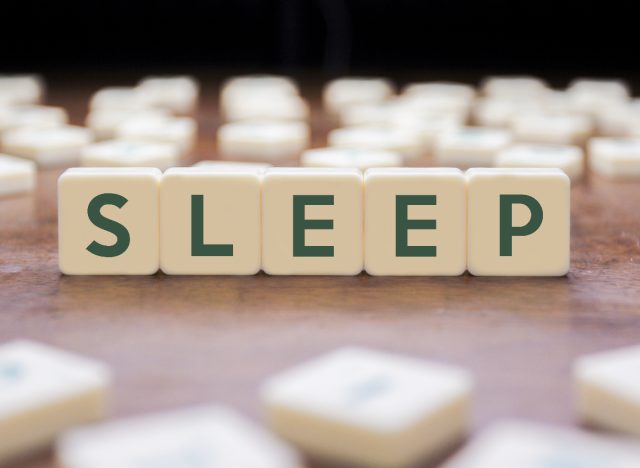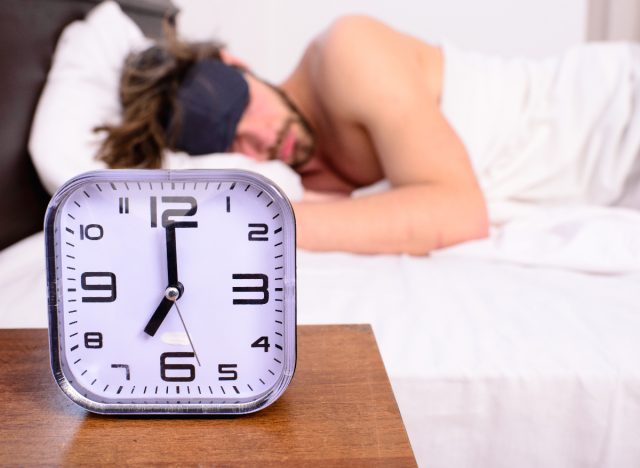You may wonder when you start yawning in the early afternoon whether you’re just bored, or your sleep routine is lacking. Did you know that just one night of not-the-best nighttime rest can negatively impact your mood and productivity? Not getting the right amount of snooze time could even put you at a greater risk of being in a car accident, according to the Centers for Disease Control and Prevention (CDC). It’s critical to get sufficient Z’s on a regular basis. So read on to learn what happens to your body when you sleep eight hours every day.
As important as it is to get the right amount of sleep, it needs to be good quality, too. Do you snore or struggle to take in fresh breaths at times while visiting Dreamland? If you think you may have a sleep disorder, it’s important to speak with your physician. Any challenges you have with getting a good night’s rest can possibly be corrected.
We chatted with Dr. Mike Bohl, MD, MPH, ALM, the Director of Medical Content & Education at Ro, who reveals what happens to your body when you sleep eight hours every day. Dr. Bohl stresses the importance of solid slumber, as it has a great impact on both your mental and physical well-being. Keep reading to learn more.


Dr. Bohl says it may seem a little bizarre that as humans, we spend a good chunk of our lives sleeping—one-third, to be exact! That being said, both your physical and mental health depend on getting solid Z’s.
While you’re snoozing, your brain remains pretty active, and a few beneficial things happen. “First, your brain is able to clear out toxins that build up over the course of the day while you’re awake,” Dr. Bohl explains, adding, “Second, sleep gives your brain time to process memories, turning short-term memories into long-term ones and getting rid of unneeded memories. Third, brain cells have an opportunity to reorganize themselves during sleep.”
All of these things contribute to rejuvenating your body and helping it ace the recovery process. Getting enough good sleep also preps your brain to make decisions, concentrate well, and soak up new info the following day. “Certain hormones are released while you sleep, and functions such as tissue repair and muscle repair occur overnight,” Dr. Bohl adds.
Related: Want to Sleep Better? Avoid These Sleep Positions, Say Experts


If you’re able to catch a solid eight hours of shuteye each night, kudos to you! This will help you maximize the amazing benefits that are associated with good beauty rest. You’ll have improved mental acuity the following day, and your body will have the proper amount of time needed to make any necessary repairs.
READ RELATED: How Screen Time Is Damaging Your Health? The Negative Effects of Screen Time
Dr. Bohl explains, “While it’s typically stated that everybody should get eight hours of sleep per night, sleep needs actually depend on your age. In general, the older you get, the less sleep you need. For example, infants require 12 to 15 hours of sleep per night, children need 9 to 11 hours per night, young adults and adults need 7 to 9 hours per night, and older adults need 7 to 8 hours per night.”
Needless to say, everyone’s time to recharge varies. It’s important to be mindful of your own body’s requirements. For instance, if you feel fatigued after getting a solid eight hours of shuteye, you clearly didn’t get enough rest. Some people are exhausted when it comes to the weekends, which can mean they’re not getting enough shuteye during the week.
Related: How Exercising Every Day Will Help You Live Longer, Expert Reveals


If you don’t get enough nights of restful Z’s, your mind and body may not function to the best of their abilities. According to Dr. Bohl, “Sleep is essential for life—in studies, when animals are deprived of sleep, they die.” If you’re lacking in the sleep department, you can feel fatigued, find it difficult to concentrate, and experience decreased reaction time.
In addition, not getting enough slumber could weaken your immune system, which makes you more susceptible to contracting diseases. If your sleep issues are chronic, you could end up developing heart disease, obesity, diabetes, or depression.


In order to get a solid night’s sleep, make sure you are exercising each day. The CDC shares that working your muscles can prep your body for some easy snooze time. Make sure your bedroom is prepped for a good night’s rest, too! Turn the thermostat down, and create a dark, cozy, and quiet setting. If you don’t have blackout shades, consider investing in a comfy silk eye mask to block out the light. A nighttime routine can be extremely helpful. Try sticking to a consistent bedtime and wake-up time, seven days a week.
There are also some things you should stay away from before hitting the sheets. Make sure you eliminate tobacco, caffeine, big meals, alcoholic beverages, and any electronics—this includes your cell, laptop, and even binge-watching your fave TV show.
Source:










